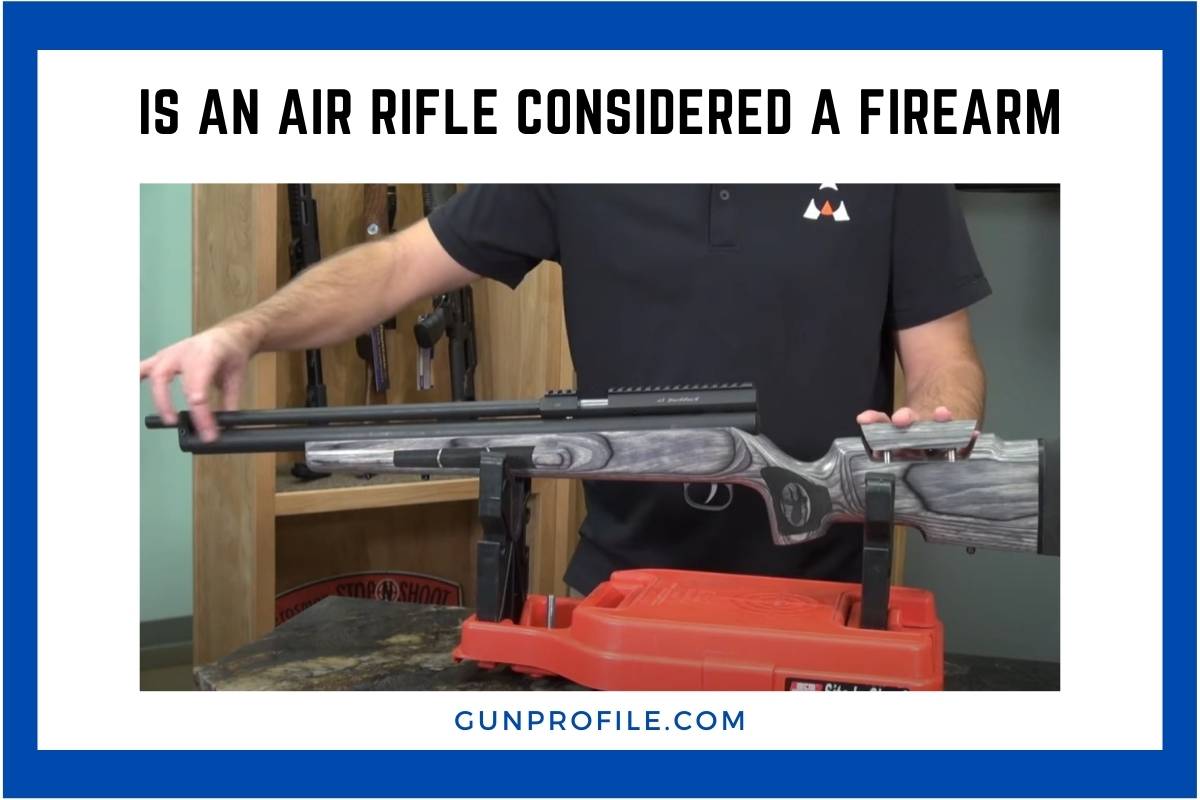Air rifles have long been a popular choice for target shooting and small game hunting. Many people wonder about their legal status and how they compare to traditional firearms. The answer isn’t always simple, as it can vary depending on where you live.
In most parts of the United States, air rifles are not legally considered firearms. The federal government doesn’t classify airguns as firearms under the Gun Control Act of 1968. This means they’re often easier to buy and own than guns that use gunpowder. However, laws can differ between states and countries.
Some places have stricter rules for air rifles. For example, in Australia, air rifles are treated the same as other guns. They need to be licensed and registered just like firearms. The United Kingdom also has limits on air rifle power before they’re considered firearms.
Key Takeaways
- Air rifles are typically not considered firearms in the U.S., but laws vary by location
- Some countries classify air rifles as firearms, requiring licenses and registration
- Local regulations may limit air rifle power, usage, and who can buy them
Definition and Classification of an Air Rifle
Air rifles use compressed air or gas to shoot projectiles. Their legal status varies by location and power level.
Air Rifle Basics
Air rifles shoot pellets or BBs using compressed air or gas. They come in different types:
• Spring-piston
• Gas ram
• Pre-charged pneumatic (PCP)
• CO2-powered
Air rifles range from low-power models for target practice to high-powered versions for hunting. Their power is measured in foot-pounds of energy (FPE) at the muzzle.
Most air rifles shoot .177, .22, or .25 caliber pellets. Larger calibers exist for more powerful models. Air rifles are often quieter and have less recoil than traditional firearms.
Legal Definition of a Firearm
The legal definition of a firearm can vary by country and jurisdiction. In many places, firearms are defined as weapons that use explosives to propel projectiles.
Air rifles don’t use explosives, so they often fall outside this definition. But some powerful air rifles may be classified as firearms in certain areas.
In the UK, air rifles over 12 foot-pounds need a Firearms Certificate. Some U.S. states have similar power limits. Australia considers all air rifles as firearms, regardless of power.
Regulatory Perspectives
Air rifles face varying regulations at different government levels. Laws differ between federal and state jurisdictions, impacting how these weapons are classified and controlled.
Federal Regulations
The federal government does not consider most airguns to be firearms. They fall outside the scope of the Gun Control Act of 1968. This means air rifles don’t require the same licensing or registration as traditional firearms at the federal level.
The Bureau of Alcohol, Tobacco, Firearms and Explosives (ATF) oversees firearm regulations. They focus on traditional firearms rather than air rifles. Air rifles are not subject to federal background checks or interstate transfer restrictions.
There are exceptions. Some powerful air rifles may be classified as firearms if they exceed certain power thresholds. However, these cases are rare and only apply to specialized, high-powered air weapons.
State-Level Considerations
State laws on air rifles vary widely. Some states treat them similarly to firearms, while others have more relaxed rules. In the United Kingdom, air rifles have power limits for non-licensed owners.
Key state-level regulations may include:
- Age restrictions for purchase and use
- Power or velocity limits
- Restrictions on use in certain areas
- Transport and storage requirements
Some cities or counties may have stricter rules than their state. Local ordinances can affect where and how air rifles are used.
Air Rifle Usage and Restrictions
Air rifles have specific rules for their use. Laws vary by location and affect how people can own and shoot these guns.
Hunting and Sporting Use
Air rifles are popular for hunting small game and target shooting. Many states allow hunting with air rifles, but rules differ. Some areas set power limits for hunting guns, while others restrict the types of animals you can hunt.
For sports, air rifles are used in Olympic and other shooting events. These guns must meet strict rules on power and design. Clubs often have their own guidelines for air rifle use on their ranges.
Many places have age limits for air rifle use. Adults may need to supervise younger shooters, and safety training is often required before using air rifles for hunting or sport.
Urban Restrictions
Cities and towns often have strict rules about air rifles. Many ban shooting air rifles in city limits to prevent accidents and noise problems.
Some areas treat air rifles like firearms. They may require permits or ban them completely. Storage rules can be strict, too. Air rifles might need to be locked up when not in use.
Public spaces usually don’t allow air rifles. Parks, schools, and other shared areas typically ban them. Even carrying an unloaded air rifle in public can be illegal in some places.
Ownership and Purchase Requirements
Rules for buying and owning air rifles vary by location. Some places have stricter laws than others. Key factors include age limits and background checks.
Age Restrictions
In most U.S. states, you must be 18 or older to buy an air rifle. Some areas allow younger teens to use air rifles with adult supervision. Illinois sets the age limit at 18 for purchasing or owning airsoft guns without supervision.
Parents can often buy air rifles for their children to use. But kids need to be supervised when using them. It’s important to check local laws, as they can differ between cities and counties.
Background Checks and Waiting Periods
Most states don’t require background checks for air rifle purchases. This is because air guns are not considered firearms under federal law. However, some states have stricter rules.
In a few places, air rifles are treated like regular guns. These areas may require:
• Background checks
• Waiting periods
• Licenses or permits
Safety and Education
Proper safety practices and education are crucial when using air rifles. Responsible handling, secure storage, and comprehensive training help prevent accidents and ensure safe operation.
Handling and Storage
Air rifles must be handled with the same care as traditional firearms. Always keep the muzzle pointed in a safe direction and treat the air rifle as if it’s loaded. Use the safety catch when not shooting.
Store air rifles in a locked cabinet or safe, separate from ammunition. This prevents unauthorized access, especially by children. Use a trigger lock for added security.
Maintain your air rifle regularly. Clean the barrel and check for any worn or damaged parts. Proper maintenance ensures safe and reliable operation.
Safety Training
Proper training is essential for air rifle users. Many shooting clubs offer air rifle safety courses. These courses cover basic safety rules, proper handling techniques, and target practice.
Key safety rules include:
- Always keep the muzzle pointed in a safe direction
- Keep your finger off the trigger until ready to shoot
- Be sure of your target and what’s beyond it
Practice in a safe, controlled environment, and use proper eye and ear protection. Learn about local laws and regulations regarding air rifle use and ownership.
Teach children about air rifle safety from an early age. Supervise young shooters closely and emphasize responsible use.
Frequently Asked Questions
Air rifle classification varies across jurisdictions. Laws differ on what counts as a firearm and how air rifles are regulated. Let’s explore some common questions about air rifles and firearms.
What constitutes a firearm under federal law in the United States?
The federal definition of a firearm focuses on explosive-powered weapons. It includes devices that expel projectiles by explosive action. This typically excludes air rifles, which use compressed air or gas.
What are the legal distinctions between air rifles and firearms in various states?
State laws differ on air rifle classification. Some states treat air rifles like firearms, requiring licenses. Others have looser rules. Air rifle regulations vary based on factors like power and intended use.
Can individuals with a felony record legally possess air rifles?
This depends on state laws. In some areas, felons can own air rifles since they’re not classed as firearms. Other states restrict air rifle ownership for felons, treating them like firearms.
How do state laws differ regarding the classification of pellet guns as firearms?
State laws on pellet guns vary widely. Some classify high-powered pellet guns as firearms, while others exempt all air guns from firearm laws. Factors like muzzle velocity and intended use can affect classification.
Are there caliber-specific regulations for air rifles in terms of firearm classification?
Some jurisdictions have caliber-based rules. Large caliber air rifles may be regulated more strictly, while small caliber air rifles often face fewer restrictions. Power output can matter more than caliber in some areas.
Does the Bureau of Alcohol, Tobacco, Firearms and Explosives (ATF) categorize air rifles as firearms?
The ATF generally doesn’t classify air rifles as firearms. They focus on explosive-powered weapons. But some powerful air rifles might fall under ATF regulation.
State and local laws may differ from ATF guidelines.

